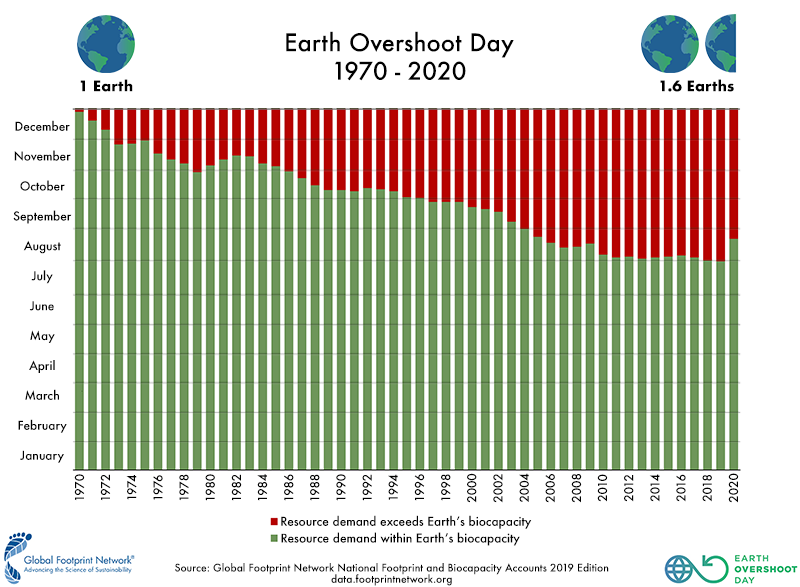
I closed today's Vox explains why wearing face masks became political in the U.S. with a programming note: "Today is Earth Overshoot Day, so stay tuned for a brief post about how the the coronavirus response has reduced human environmental impact." With that, I'm sharing two videos. The first comes from Euronews, Humans have now consumed the Earth's natural resources for the year, which highlights the bad news about the day.
It's called "Overshoot Day", the moment each year when we humans have used up more natural resources than the Earth can renew in 12 months.Only at the end does Euronews point out that this year is an anomaly because of the COVID-19 pandemic.
News 9 from India did a much more thorough job in Pandemic effect: Consumption of earth’s resources drops.
[According to r]esearchers at Global Overshoot Day, the rate at which humanity is consuming the Earth’s resources declined this year due to the COVID-19 pandemic.While the video pointed out that earlier recessions had reduced humanity's ecological footprint before, the results has usually delayed Earth Overshoot Day by days, not weeks, if at all, and can be short-lived. The record of past Earth Overshoot Days shows that the Great Recession of 2007-2009 merely stalled the date at August 14th in 2008 and pushed it back 4 days to August 18th in 2009. In 2010, it advanced 11 days to August 7th. The 2001 recession merely slowed down the trend, with the date moving back 1 day from September 22nd to September 23rd. Before that, the Gulf War recession of 1991-1992 held the date at October 12th during 1992-1993. The longest lasting effect was from the double-dip recession (Reagan Recession) of 1980-1982, when it took 5 years for the date to return to November 4th. As for this year, it's the latest date for Earth Overshoot Day since 2005, when it fell on August 25th. I don't expect it will be this late next year.
Enough history. How effective have I been at reducing my footprint this past year? Follow over the jump.
Here's what I wrote last year.
This was my footprint last year.I took the "test" this year and found out that if every human on the planet lived like me, they would require 2.8 Earths and my personal Earth Overshoot Day was May 7th. I beat my goal! I now need 4.8 global hectares to support me, 1.7 of which goes to my diet and 0.5 to mobility. While this is not really sustainable, it's better than I expected.I calculated my environmental impact at Global Footprint Network and found out that if everyone followed my lifestyle, humanity would need 3.8 planets and that my personal Earth Overshoot Day would be April 5th. Eep! That's the bad news.This year, I found out that if everyone lived like me, humanity would need 3.5 planets and that my personal Earth Overshoot Day would be April 14th. Progress! I'm not at my current goal of having the impact of the average German, which is 3.2 Earths, but I'm getting there.
The good news is that I'm less of a resource hog and waste producer than the average American, whose lifestyle would require 5.0 planets to sustain it if all 7.6 billion of us followed it. I require 6.6 global hectares to support me, while the average American requires 8.22.
Last year, I found out one of the things that increased my footprint was my diet. I was eating too much meat, which meant a full two hectares to feed me. I cut down a bit on the meat I ate and it made a difference. I now require 1.9 hectares for my diet. Again, progress.
I'm going to wait to set a new goal until next year, when I expect I will be driving more and my footprint will go up. In addition, the average German has shrunk their footprint from 3.2 Earths to 3.0, rounded up from 2.97, so my goal has moved. If I am still at or below 3.0 Earths next year, then I will pick a new target country, which will probably be France with a footprint of 2.73 Earths. Stay tuned.
No comments:
Post a Comment